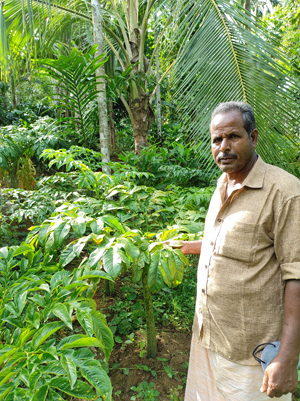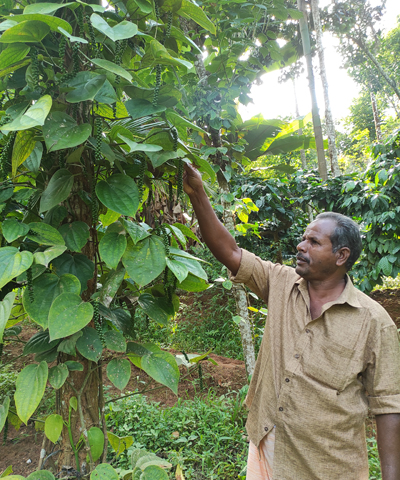Joseph John

Wayanad is home to a number of traditional crop varieties ranging from rice, tubers, banana and many leafy greens. These varieties are very important in terms of the gene pool and can contribute significantly towards the research and conservation of agrobiodiversity. This rich agrobiodiversity is conserved by the indigenous community as part of their livelihood and culture. Mr. Babu Nellara from Nellarachal in Wayanad is one such tribal farmer from the Kuruma community who is conserving many traditional varieties of tuber crops, banana and rice at his farm. His 2.75 acres of land is a treasury of 14 varieties of tuber crops, 12 varieties of banana and 9 varieties of traditional rice in addition to coffee, areca nut and pepper vines. Mr. Babu strictly follows organic means for crop cultivation wherein cow dung and urine is the value added by making fermented natural fertilizers such as Jeevamrutha and Beejamrutha. Among the banana varieties conserved in his plot, the Wayanadan Vazha is one of the unique one as its leaves and bunches find special preference in sadhya and people from Kerala and other states often visit him to collect the variety. “Every farmer should conserve at least this Wayanadan variety of banana in their farm because of its attractive appeal and high resistance to pests and diseases”, says Mr. Babu.
An interesting innovation by Mr. Babu is especially useful for the small and nuclear families who wish to consume tubers but choose not to due to the oversized tubers. Since the micro family system likes to use smaller sized tuber such as Dioscorea, Mr. Babu felt the need to develop smaller tubers instead of the traditional large ones. Hence, he himself initiated field trials and experiments at his field in this regard to achieve the development of micro tubers. In this method, the smallest piece (unit seed) of Dioscorea- the Inchikachil was used as the planting material and given minimum inputs to grow. While planting, care was also taken to avoid places where waterlogging prevails and it was also made sure that planting was done in soil with the highest content of sand in it. This method actually worked and helped Mr. Babu to harvest the tuber with a maximum yield of just 3 kg compared to the conventional yield of 8 to 10 kilograms. These small-sized tubers are particularly useful for small families and the market gap was efficiently met by Mr. Babu’s unique idea.

Farmer conserves commercially important varieties of tubers, banana and rice
Mr. Babu reflects that the support of M.S. Swaminathan Research Foundation (MSSRF), Central Tuber Crops Research Institution (CTCRI), Thiruvananthapuram and Regional Agriculture Research Station (RARS) was crucial for him to actively engage in farming activities. He further said that these institutions provided necessary support in availing the seeds, fertilizers and advice as when it was required. In addition to that, he also got support for selling his crop produce through the market outlets facilitated through the institutions. Mr. Babu revealed that exhibitions and seminars organised by the institutions also played a key role in making the marketing of his products easy. Some of the tuber crop varieties cultivated by him like Inchikachil, Kaduvakkayyan etc. are a major attraction in the Poopoli festival and other exhibitions around the district and state as well. Many farmers even directly came to his house for purchase due to the exposure and the marketing became easier. Besides, the organic product allowed him to fetch a premium price than the ordinary one in the open market
